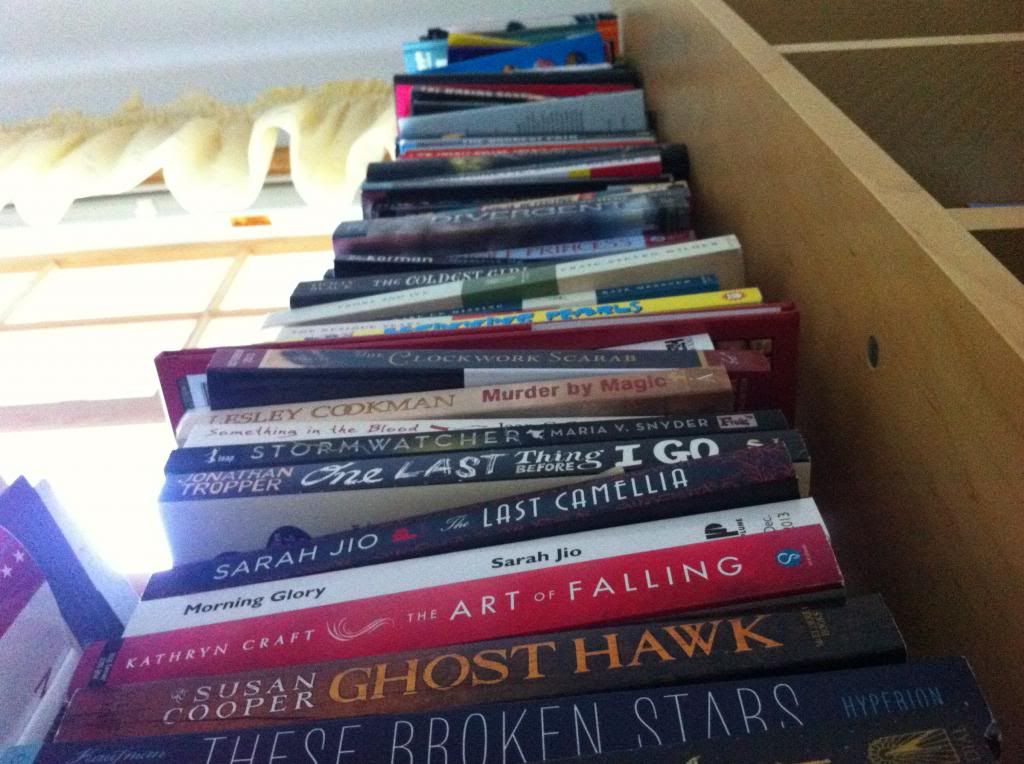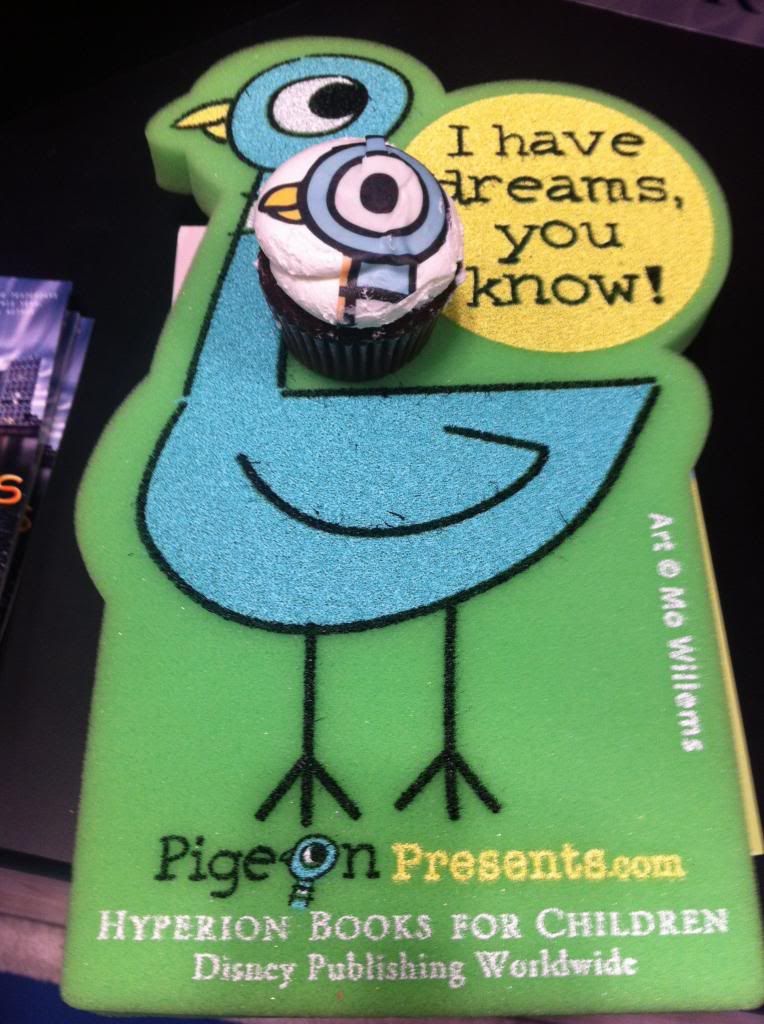
| NYFW | BEA |
|---|---|
| Dress is extremely fashionable | Dress is power-lunch or power-walk |
| Runway shows with next season's clothing | Galley proof giveaways of next season's books |
| Stars are mobbed for autographs | Authors are mobbed for autographs |
| Editors spew theories about "upcoming trends" | Editors spew theories about "upcoming trends" |
Totally the same thing! Except with people happily eating cupcakes at parties, and a focus on books instead of clothing...

Trend Report
YA Dystopian is Dead. Long Live YA Contemporary, Diversity, and Melded Genres
Editors from Arthur A. Levine Books/Scholastic, Candlewick Press, The Atlantic, and Disney-Hyperion proclaimed that the YA Dystopian trend is over, but every few minutes they seemed to decide another buzzword was the future of the YA market. I can’t remember if different publishing houses were predicting different trends, but it seems like the YA book world could be spending the next season in transition before a new real trend emerges. Let’s face it, diversity and melded genres cannot be a fad the way that vampires/werewolves/angels/corrupt futuristic governments have been because something that’s offering novelty at every corner is not going to gain the trust of reluctant readers. (Unless you distill “diversity” into a trite common theme of “I’m different but I love myself for it!” which I very much hope doesn't happen.)Based on the galleys I picked up and the books I heard about at the panel, transcending time is a theme, whether through literal time travel (the much-hyped All Our Yesterdays), genetic immortality (Wake Up Missing), or ghosts (Marie Antoinette, Serial Killer; Plague in the Mirror; Raven Boys quartet; These Broken Stars).
As for the editor-observed diversity theme, maybe there’s a Native American Indian moment coming this fall (Ghost Hawk, If I Ever Get out of Here, Sorrow’s Knot), but it looks like there’s a long way to go still.
Welcome Back, Stand Alone Novels!
The editors on the YA panel said that they are “weary” of the trilogy craze that has dominated the market for years. We can only hope that readers agree, and that John Green gets some healthy competition on the NYTimes YA Bestsellers list.New Adult Fiction
This is the latest buzzword, and it seems to describe YA-like books with late teen / early twenties main characters who have more sex than normal YA characters. I think I picked up two that may qualify (Left Drowning and The Art of Falling). The only thing truly interesting about New Adult is that there’s no consensus on whether it exists.I think it may work like imaginary numbers, so when a publisher has only one manuscript that seems like New Adult, it gets marketed as YA; but two manuscripts get farmed to genres, three claim a mature YA designation, and if there are four then the publisher can announce that New Adult is real. (Yes, the math on this is not just imaginary but wrong.)
American Girls Historical Book Questions
(because you know you had them too)Why did Elizabeth Cole (Felicity books) become a blonde, and did someone simply Photoshop all the images of her to keep girls from learning she originally had beautiful dark brown hair?
At the time of the Elizabeth Cole BFF doll creation, American Girl determined that they had overrepresented brunettes, and for the sake of balance they needed another blonde. I really enjoyed talking to the American Girl editor, but it is INSANE that the American Girl/Mattel people thought that blondes should be 40% of their visual image.As for how such hair changes are done, the illustrator was asked to rework some pictures. There may have also been some Photoshopping involved, but it was mostly done by hand.
Why wasn’t Ivy the main character of the Julie/Ivy 1970s pair? Did American Girl really need another blonde?
The process of making an American Girl historical character starts with brainstorming issues or events that the company would like to address, matching these to a time period, and fleshing out further themes for the series. The company then commissions an author, who develops the character’s personality and stories. After that, the company determines what the character looks like (by figuring out what color hair they need, as we saw above).In the case of Julie/Ivy, author Megan McDonald wrote a draft of Meet Julie that described Ivy. The production team loved Ivy so much that they hired an additional author, Lisa Yee, to write a separate book about Ivy in time for the Julie launch.
I still think it’s weird that American Girl’s efforts towards showing the diversity of experiences and circumstances in American history, as well as the unity of family and friendship bonds, hasn’t led to an AAPI main character in the historical line. I can only guess that the story the editor told me about Ivy’s inception means that American Girl legitimately didn’t realize it was ignoring the AAPI community, and when they saw Ivy in the Julie draft, they decided to create an Ivy doll before drawing too much attention to their oversight.







3 comments:
The book haul is truly impressive, and I'm looking forward to checking out the blogs of your new friends! I think the editor predictions for upcoming YA trends mostly just show that they don't know what those trends are going to be... XD I would be excited to see more standalone novels--I feel like it's harder to do those well, and trilogies...well, they've been a fad since at LEAST sometime when we were in college. I don't mind a trilogy here and there, but I think the market has become flooded.
On the subject of American Girl, I think they may have some Asian American Pacific Islander girls in their "girl of the year" collection of contemporary girls/dolls/stories. But you would think they'd have an historical one, too. San Francisco, railroad times? Why not? Also, I think for Kaya in particular they needed to dispense with the formulaic book titles, because based on the culture some of them just didn't fit--"Happy Birthday, _____!" if they don't celebrate birthdays, and "______'s Surprise" was usually a Christmas story. But now that I think about it, I guess they could've finagled most of them to make them fit. "____ Learns a Lesson" doesn't have to take place in an actual school, "___'s Surprise" could just be...a surprise. Fun fact: On the AG Wikia I found out that Kaya is the only doll to not show her teeth because that's a no-no in Nez Perce culture. (I have realized we talk about AG a lot for twenty-somethings. XD)
(Also, your table made my brain explode from the awesome coding, and I really want a pigeon cupcake.)
First off, love that shot of your BEA books - although it looks rather hazardous!
Moving on. I WISH LIKE HELL I'd been along for your American Girl interrogation. I, of course, loathe what Mattel has done with the company, but I would have been interested in all the dirt about the books. But seems like you got it all covered.
And for the record: I loved the formulaic titles as a girl. That way I could scan my shelves and immediately knew if I had to kick someone in the school yard for not returning a book.
That pile was so hazardous that as soon as I got the shot, I removed the top part before letting myself breathe again. Or at least it's that way in my memory...
I don't think I knew you when I was in AG-land! (Which is sad in itself!) Kristen and I had stopped by the AG booth at Happy Hour the first day, and when I asked about Elizabeth Cole's hair the people at the booth handed me an envelope with the book about my changing prepubescent body (obviously necessary reading at my age), and told me that the person who could actually field Historical questions would be around on Thursday. But I really wish you had been there too because it really was fun to finally get to ask an insider these questions. Even if all the answers were more PC than the real motives that I've always suspected were "Barbie sells really well. Barbie is a blonde. Therefore, blonde dolls sell well and we need more blondes."
I LOVED the formulaic stuff as a girl too. According to the editor, there are a lot of us who are resistant to change, because every time they do something like take away our titles (grr!!) they get a slew of former-fan letters.
Post a Comment